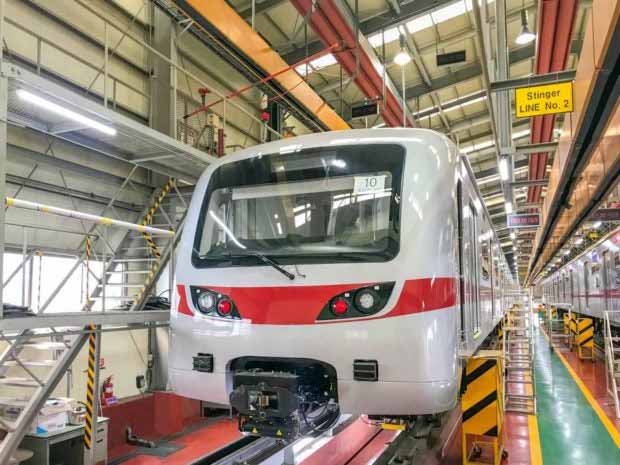CITY OF SAN JOSE DEL MONTE, Bulacan –San Miguel Corporation’s (SMC) infrastructure unit has secured a P100-billion syndicated loan agreement with a consortium of major Philippine banks for its ongoing Metro Rail Transit 7 (MRT-7) project— its first foray into mass transport systems.
The fund, which reached a financial close last June 1, will help further speed up the construction of the MRT-7, which is at 61.92% completion as of June 14, 2023.
“We are happy to have achieved this milestone. It reflects the confidence that our partner banks have in the government’s vision for progress, and our ability to execute on vital projects that are critical to the country’s social and economic development and growth,” SMC president and CEO Ramon S. Ang said.
This funding is also a testament to the resilience and strong business prospects of SMC and its subsidiaries amid a very challenging macroeconomic environment.
“The support we are getting from major Philippine banks shows that they recognize how important this project is to many Filipinos, and appreciate our overall vision of a Philippines made more progressive, resilient, and competitive, through investments in major projects such as efficient mass transport systems,” And said.
He added: “MRT-7 will generate countless jobs, boost local economies, and create more opportunities for so many Filipinos. We are grateful to our lenders as this facility will allow us to remain on track to meeting our target to start operations in 2025 bringing us closer to a future where Filipinos can reap the benefits of enhanced mobility and accessibility,” he added.
The Marcos administration has identified the MRT-7 project, which runs from Quezon City to San Jose del Monte City in Bulacan, as one of 194 high-impact infrastructure flagship projects under its “Build Better, More” program, which is deemed crucial to improving the quality of life of Filipinos.
Members of the consortium are BDO Unibank, Philippine National Bank (PNB), Bank of Commerce (BankCom), Security Bank, and the Government Service Insurance System. Lead arrangers and book runners for the transaction are BDO Capital & Investment Corp., PNB Capital and Investment Corp., SB Capital Investment Corp., and BankCom-Investment Banking Group.
Meanwhile, providing advice to the lenders and borrowers are the law firms of Picazo Buyco Tan Fider & Santos, and SyCip Salazar Hernandez & Gatmaitan, respectively.
Members of the consortium said they were honored to be involved in the landmark agreement for the MRT-7, which they described as an important infrastructure investment that will support the economic recovery of the country.
“SMC’s investments in various infrastructure projects boost the economy as these initiatives facilitate improved connectivity between regions and communities, positively impacting trade, tourism, and overall social integration. We commend SMC for taking these steps towards the country’s growth and we are proud to be their partner in this esteemed endeavor,” said BDO Capital & Investment Corporation President Eduardo V. Francisco.
PNB Institutional Banking Head EVP Jun C. Audencial said: “Investing in infrastructure paves the way to improve productivity and growth, expand distribution networks, facilitate trade and connectivity, and promote economic inclusion. SMC helps provide job opportunities for Filipinos and makes the country more industrially competitive. Infrastructure investments are a step towards economic recovery and growth, and nation-building.”
For its part, BankCom said it welcomed the opportunity to participate in the SMC project, which it said would “hugely uplift our society and contribute to the Group’s vision of a resilient and globally competitive Philippines.”
“Massive infrastructure projects such as the San Miguel Group’s investment in the MRT-7 play a crucial role in building the nation. As SMC Infrastructure continues to strengthen its portfolio and operate the largest infrastructure network in the country, the lives of thousands of Filipinos are made better through safe, sustainable, and accessible transport systems,” said BankCom President and CEO Michelangelo R. Aguilar.
Security Bank president and CEO Sanjiv Vohra, meanwhile, said the bank fully supports infrastructure projects that contribute to the overall development and growth of the Philippine economy, saying that SMC “is at the forefront of nation-building through its various infrastructure projects that bear national importance and greatly benefit Filipinos.”
“We recognize the economic importance of the MRT-7 as it provides a much-needed mobility option for the general population that is safe, fast, and reliable. With this project, we are truly proud to enable a convenient, alternative means of transportation that will help commuters from Quezon City to Bulacan to have more time for work, family, and recreation,” the bank official said.
GSIS, the pension fund for government workers, explained that “state involvement in infrastructure projects plays a crucial role in establishing a robust economy. “Aligned with the GSIS’s vision of actively contributing to nation-building, we are pleased to lend a hand in easing passenger transportation challenges and reducing traffic congestion in Metro Manila, particularly in the transportation routes heading to and from the northern part of the Greater Manila Area,” GSIS president and general manager Jose Arnulfo “Wick” Veloso said.
The MRT-7 project will have 14 stations, namely: Quezon North Avenue Joint Station; Quezon Memorial Circle; University Avenue; Tandang Sora; Don Antonio; Batasan; Manggahan; Dona Carmen; Regalado; Mindanao Avenue; Quirino; Sacred Heart; Tala; and San Jose del Monte. It can accommodate 300,000 passengers in its first year of operations, and up to 850,000 passengers daily in its 12th year.
The project will also feature an intermodal transportation hub catering to other types of public transportation, as well as a 19-km highway from San Jose del Monte to Bocaue, Bulacan. (UnliNews Online)


